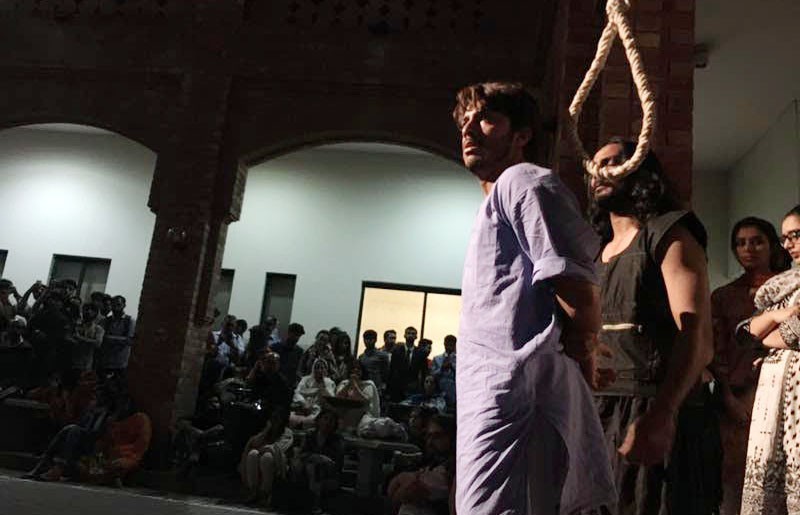
Based on real-life accounts collected by Justice Project Pakistan, FCCU’s immersive theatre play, Intezaar, explores the darker end of the word’s spectrum

Like its English translation, ‘wait’, the Urdu ‘intezaar’ is a nuanced word, capable of addressing both joyous anticipation and dread. Forman Christian College University, Lahore, recently hosted an immersive theatre performance, titled Intezaar, which explored the darker end of the word’s spectrum.
Enacted by the team of Ajoka Theatre Pakistan, the play was a collaborative effort: it was based on real-life accounts collected by Justice Project Pakistan; directed by Dina Mousawi of Complicite; produced by Ryan Van Winkle of Highlight Arts; and written by Shahid Nadeem of Ajoka. The student body at FCCUwas the surprise participant in this theatrical experiment.
In Intezaar the play, the wait is more than simply anticipation; it is the patience enforced upon death row inmates by a judicial system bogged down by red tape. It is also the reluctant resignation of their families as they await the macabre fate that has been decreed for their imprisoned relative.
It was also a tangible presence as the audience waited for the myriad stories to unfold.
The multilayered meaning that ‘intezaar’ assumes in the lives of the death-row prisoners and their families is reiterated through the multiple levels at which the performance was ‘staged.’ The character of the Magistrate stands on the terrace of the first floor, high above the poor mortals languishing in the courtyard of the ground floor, scared of being crushed under the "boot of the death penalty."
As the play unfolds, the apathy of the criminal justice system becomes as blinding clear as the bright spotlight that shines on the Law’s representative.
The square courtyard at FCCU’s Elahi Block was the perfect site for the sobering play, with the circle of viewers providing a literal boundary to the boxed-in existence of the condemned prisoners.
An ominous beat on tin boxes heralds the entry of the prisoners into the spotlight after two constables firmly engage the audience as a participant by stamping random people with the word "mulaqati" (visitors). The prisoners’ self-introduction through the numbers assigned to them as criminals begins the tale of dehumanisation that those condemned to execution experience daily, becoming "neem murda"(half-dead).
The circumstances surrounding the conviction of the seven prisoners are retold for the audience in bits and pieces, with each tale serving to strengthen the argument for a review of capital punishment in the country. Prisoner Khadim Hussain, also known as Dr Saheb for the astounding number of degrees he earned while in jail, is a particularly strong character.
The plight of the families outside the jail, who also die a thousand deaths before the noose stifles their relative’s last breath, is aptly captured by the distraught mother of a falsely convicted and hastily executed inmate.
Names were changed to protect the privacy of real-life prisoners whose stories were being enacted for a university audience. From the schizophrenic patient to the disabled convict and the woman tortured to the point of dumbness, each sketch was a sobering reminder of the structural flaws that continue to impede the delivery of justice in Pakistan.
Yet, despite the dark theme, the play was presented in a manner that stopped it from becoming too heavy a pill to swallow for the (mostly) young audience. Brief impromptu singing in Punjabi from a ‘choir’ made up of prisoners beating different types of pots and boxes offsets the bleakness of an impending execution.
The prisoners breaking into short dance sequences might have been intended as a reflection of their resilience and courage but like the lunacy of a grief-stricken King Lear, echoes helplessness.
The reaction of the crowd gathered around the courtyard at FCCU should, however, give some hope to the four organisations that worked together on this controversial but highly important subject. The loudest claps erupted at the mention of mercy for the sake of humanity.
Justice Project Pakistan has been spearheading a campaign, called ‘Bring it back’, to reinstate the moratorium on death penalty that was lifted by the government of Pakistan in the year 2014. As many as 434 prisoners have been executed since then, while another 8,200 condemned to capital punishment languish in jails. With Intezaar, an attempt at socially meaningful art is sure to start a discussion about the need to humanise the plight of death-row prisoners. Judging from the standing ovation by the viewers, the team behind this thought-provoking play might just be successful in their advocacy for mercy.